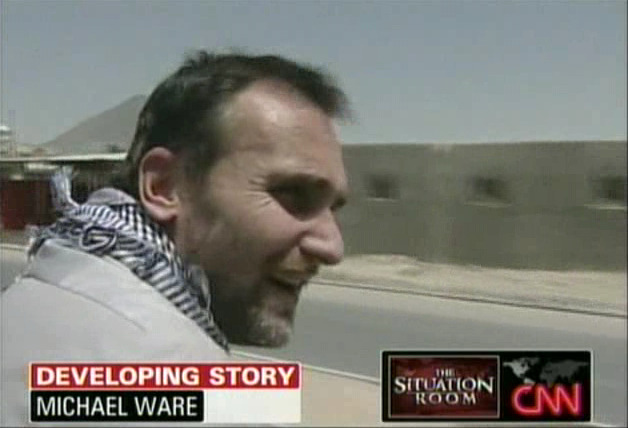TSR: "...engaging the tribes to attack the Taliban and keep them out of their area."
Wednesday, September 09, 2009

Length: 5:14
LARGE (60.5 MB) ----- SMALL (6.4 MB)
A preview of the piece to air on AC360 tonight, as Michael travels through Kandahar to see how the city has changed since he left it to go to Iraq.
WOLF BLITZER: The stakes have never been higher in Afghanistan, where the situation looks increasingly shaking. The government is accused of outright election fraud. American casualties right now are on the rise. And Taliban insurgents are making a bloody comeback.
CNN has deployed its full resources to the war zone.
Our Michael Ware has been to Kandahar, a strategic city which remains right on the edge of Taliban territory. It's a city Michael used to know very, very well. Here's his report.
(BEGIN VIDEOTAPE)
MICHAEL WARE, CNN CORRESPONDENT: How does that make people feel here in Kandahar?
(voice-over): I wanted to see what had happened to this place since I had left. Kandahar: it's the birthplace of the Taliban and the capital of the south, the fiercest combat zone. I once lived here, before Iraq and after the fall of the Taliban.
(on camera): So much has changed here in Kandahar. There's new buildings. There's new roads. There's new tree lines. But there's also a new Taliban. There's a Taliban here that wasn't here just a few years ago and this city now lives in the shadow of the Taliban.
The Taliban control neighborhoods here. In fact, this is a Taliban neighborhood. These police are from a police station right in the midst of a Taliban stronghold. They're very much on the front lines guarding the gates to Kandahar.
(voice-over): In fact, here in this marketplace, the mood among shopkeepers is anxious. "Everyone in Kandahar is saying the city is surrounded," this businessman says. "There's something like 200 men standing here. Go. Ask them -- is there Taliban or not?"
Here, the sense of a city under siege goes much deeper than just hurting business. Even here in the city, you cannot speak out against the Taliban. "Those who do speak up face a terrible conclusion," this shopkeeper says. I found, for many, these fears are growing -- even though a major U.S. and Canadian base is located at Kandahar's air field, just outside the city limits -- their vehicles in the city streets.
(END VIDEO TAPE)
BLITZER: And Michael Ware is joining us live now from Kabul. Amazing stuff you've been working on, Michael, over there. But tell us once again why Kandahar -- what happens in Kandahar could be a barometer for what happens in all of Afghanistan.
WARE: Well, it's certainly going to tell us what's happening with the Taliban itself -- the foremost enemy of coalition troops here. Let's not forget, Kandahar is the second largest city in the country. It's the capital of the south. It's the old imperial capital. And it's the birthplace of the Taliban.
So what goes down on the streets of Kandahar will tell you so much about which way goes the south of the country.
Obviously, there's different issues to the north and to the east, as you approach -- to the west as you approach Iran. But Kandahar gives you a very good measure of how President Obama's war against the Taliban is faring. And, quite frankly, Wolf, that measure right now is not a good one. It's something to worry about -- Wolf.
BLITZER: It seems, to a lot of experts out there -- and you're one of them, Michael -- that all the options before the U.S. right now -- and there are several different options, including sending thousands of additional troops -- all the options are pretty bad right now.
Are there any good options?
WARE: Well, there is one element that's been missing from the mix, according to a lot of the major players I've spoken to in Kandahar. Many of them have been telling me, you know, when I first arrived eight years ago: you're never ever going to have enough international troops, American or otherwise, to get the job done here. And you probably won't get enough Afghan Army troops either -- certainly not in the time frame that the American public is allowing President Obama.
So you've got to start looking for other solutions. Now apart from negotiations and political solutions that could lead to an end to the conflict by dealing with the Taliban, there's something else, as well. It's learning from the lessons of Iraq and transporting them here. It's engaging the tribes to attack the Taliban and keep them out of their area, to arm militias -- in many ways turning back to the old warlords, who won the Soviet war here in Afghanistan in the '80s -- some of whom have returned to the Taliban not because they believe in the Taliban cause, but because they're so disenchanted with the Afghan government and the American mission.
And I can tell you, the Karzai family is calling for a return to tribal militias. And there is some interest within the U.S. military to look at this option because of the successes we saw in Iraq. That could be the missing element -- Wolf.
BLITZER: And General David Petraeus, who's the U.S. military commander for the Central Command, which overseas Iraq and Afghanistan, he certainly understands this situation well.
Michael Ware, be careful over there.
